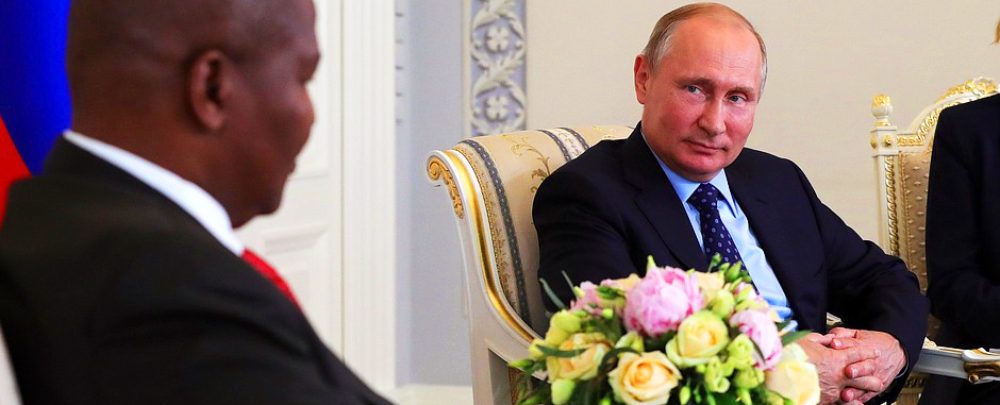By Joseph Siegle
February 8, 2023
Unaccountable regimes in Africa are highly vulnerable to exploitation by external authoritarian actors—at a heavy cost to citizen sovereignty.

CAR President Faustin-Archange Touadéra on a visit with Russian President Vladimir Putin. (Photo: kremlin.ru)
Lost in the whirlwind of crises that have dominated headlines over the past year is the erosion of African popular sovereignty. This is most vividly seen through external authoritarian governments gaining control over national policymaking structures in selected African countries. Prime among these is Russia. Through its elite cooption model, Russia props up unpopular and isolated leaders, gaining Moscow outsized influence.
In the Central African Republic (CAR), Russian “support” to President Faustin-Archange Touadéra includes a Russian National Security Advisor, the Russian paramilitary Wagner Group as his presidential guard, and Russians embedded in the Ministry of Finance and Customs. The Wagner Group now controls key gold and diamond mining sites in CAR, facilitating the trafficking of its natural resources. Moreover, Russian has become CAR’s third official language.
“Russia has attempted to derail democratic transitions in each African country where it has gained influence.”
Russia has similarly gained disproportionate influence in Mali. The military junta of Assimi Goita, which had ties to Moscow prior to its coup, invited Wagner in ostensibly to help fight militant Islamists. Yet, Wagner’s1,000 troops have focused on keeping the junta in power, while taking control of gold mines in the country. The junta, in turn, has become more hostile toward regional and Western security partners. Consequently, thousands of partner forces are now departing Mali while the jihadist security threat is escalating.
Wagner, meanwhile, faces accusations of human rights abuses in CAR and Mali as well as Libya and Sudan. Citizens in mineral-rich regions of these countries have been intimidated into leaving their homes, resulting in a form of natural resource annexation.
Russia has attempted to derail democratic transitions in each African country where it has gained influence—and has sights on expanding its influence. Russian disinformation campaigns have asymmetrically enhanced its sovereignty-sapping efforts—puffing up perceptions of popularity in Moscow’s favored regimes while denigrating and attempting to delegitimize democracy.
China and some Arab Gulf States are also attempting to undermine African sovereignty. China’s approach is highly institutionalized with investments in Africa’s media houses and journalism training to control the information space. In 2022, China also opened its first overseas political party leadership school in Tanzania—to strengthen its party-dominated governance model on the continent. Gulf States have been active in North Africa and the Greater Horn, backing proxy politicians in the effort to establish greater influence and prop up autocratic political leaders—stymieing citizens’ democratic aspirations.
2022 has underscored that unaccountable regimes in Africa are highly vulnerable to exploitation by external authoritarian actors—at a heavy cost to citizen sovereignty.
Originally appeared in Africa: Year in Review 2022 by the Wilson Center Africa Program.
More on: Russia in Africa Disinformation
